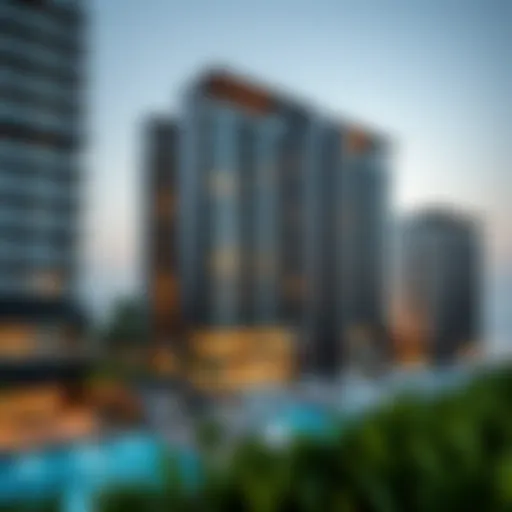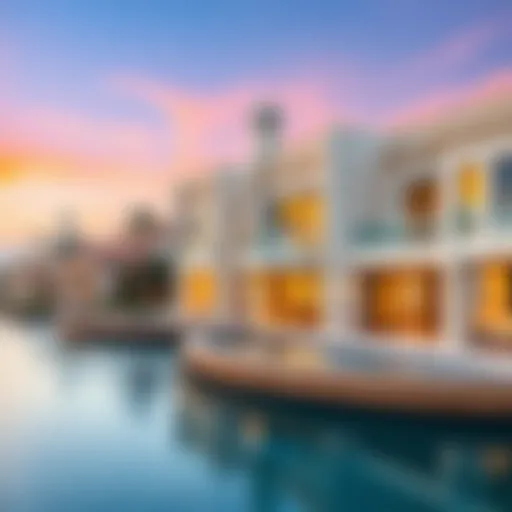Assessing Solar Panel Prices in Dubai's Market
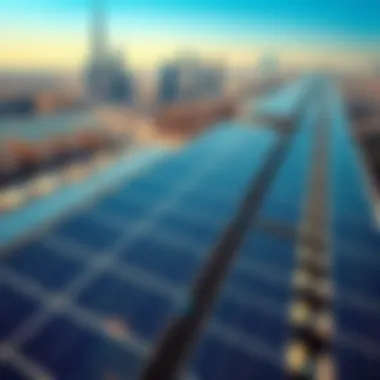

Intro
The increasing interest in renewable energy has spurred significant developments in the solar panel market, especially in vibrant cities like Dubai. The abundance of sunlight combined with government initiatives aiming to bolster sustainable practices has created a compelling niche for solar energy. As such, understanding the factors that influence solar panel pricing in Dubai is essential for anyone looking to invest in or switch to solar energy.
In this article, we will navigate through the labyrinth of solar panel costs, exploring relevant elements such as installation expenses, available incentives, and unexpected market shifts that can sway pricing. We will delve into the local trends while also drawing comparisons with global dynamics to paint a holistic picture. Whether you are a homebuyer eyeing solar energy for your new property, an investor considering putting money into renewable resources, or a stakeholder in the real estate sector, having a grasp on these financial aspects is critical.
Shall we dive right in?
Market Insights
Current Trends in Dubai Real Estate
The recent years have seen a boom in real estate developments across Dubai, with emphasis on eco-friendly constructions.
Major projects like the Dubai Sustainable City are setting the bar, encouraging residential and commercial buildings to incorporate renewable energy solutions, including solar panels.
The demand for solar services has surged as buyers seek properties equipped with energy-efficient technologies. Out of necessity, this trend is reshaping the urban landscape, challenging developers to find innovative ways to lower costs while maximizing sustainability.
Moreover, property values tied to solar-equipped homes are witnessing a shift. As green buildings gain traction in the market, they often demand a premium price, which in turn influences overall solar pricing strategies.
Emerging Areas and Investment Hotspots
Dubai is continuously evolving, presenting new opportunities in solar energy investments. Places like Dubai Hills Estate and Mohammed Bin Rashid City stand out. These regions are not just about stunning architecture; they are becoming benchmarks for energy efficiency. Investors are taking notice; hence, these hotspots are attracting a mix of homebuyers and developers alike, eager to capitalize on the emerging green energy trend.
Investors need to consider both established neighborhoods and up-and-coming areas that favor international standards for renewable energy adaptations. Staying informed will empower them to make data-driven decisions regarding solar panel placements.
Buyer and Renter Guidance
Comprehensive Buying Process in Dubai
When embarking on the journey to buy solar panels in Dubai, understanding the purchasing process is crucial. The path usually starts with identifying the right technology that meets your energy needs. Buyers should carry out research or consult experts to identify reliable manufacturers like SolarWorld or Trina Solar, which are known in the region.
Next, compare quotes from multiple suppliers to ensure competitive pricing. Below are some steps to streamline your buying experience:
- Determine your energy needs to assess how many panels you require.
- Research accredited solar panel suppliers and installers.
- Request quotes from at least three different companies.
- Assess installation costs and any ongoing maintenance fees.
- Inquire about available government incentives and rebates that can offset costs.
Essential Tips for Renters in Dubai
For renters, solar options may seem elusive at first, but hope is not lost. Many apartment complexes are beginning to integrate solar energy systems, providing tenants with sustainable living choices. Here are some points to consider:
- Ask about solar provisions: Inquire with your landlord or management about existing solar arrangements or future plans for green energy initiatives.
- Review your lease: Ensure there's flexibility regarding energy usage, as this could affect your bills, especially if the building uses solar energy.
- Stay informed: Keep your eyes peeled for new buildings that advertise eco-friendly features, as they often yield lower energy costs in the long run.
"Investing in solar energy is not just about saving money; it's about contributing to a sustainable future while enhancing property value."
In summary, comprehending the intricacies of solar panel pricing in Dubai is not only beneficial for homeowners and investors but essential for all who engage in the local real estate market. By staying abreast of trends, understanding costs, and being proactive about solar options, anyone can make informed decisions that align with their goals.
For further information on sustainability initiatives in Dubai, check resources like Dubai Electricity and Water Authority, or explore scholarly articles at Britannica for in-depth knowledge.
Prologue to Solar Energy in Dubai
In a city like Dubai, where sunlight is abundant, the shift towards solar energy isn't just a trend; it's a necessity. Given the region's climate and its progressive vision for sustainability, solar energy adoption emerges as a game-changer for both homeowners and larger investors. This introduction sets the context for understanding solar energy in Dubai, highlighting its significance as we evaluate panel prices throughout the article.
Overview of Solar Energy Adoption
Dubai has made substantial strides in integrating solar energy into its power grid. The Dubai Clean Energy Strategy 2050 aims for 75% of the city’s energy to come from clean sources by that mid-century mark. This ambitious goal reflects not just environmental considerations but also economic ones. The government has initiated several projects, such as the Mohammed bin Rashid Al Maktoum Solar Park, which is poised to be one of the largest solar parks in the world. With prices for solar technologies decreasing over the years, there’s never been a more favorable time for both individual homeowners and commercial entities to invest in solar energy.
Energy prices in Dubai have traditionally hinged on fossil fuels, but the winds of change are blowing; investing in solar energy can result in lower utility bills. Many homeowners view solar installations as an investment that typically pays back in just a few years due to these savings. Moreover, summer months in Dubai are scorching, leading to higher energy consumption with air conditioning units running non-stop. Solar panels can significantly mitigate these costs.
Key Points:
- Dubai’s energy policies encourage solar adoption, with governmental initiatives paving the way.
- Economic incentives and favorable weather conditions boost consumer interest in solar technology.
- Investing in solar not only aids in personal savings but also furthers the region's commitment to sustainability.
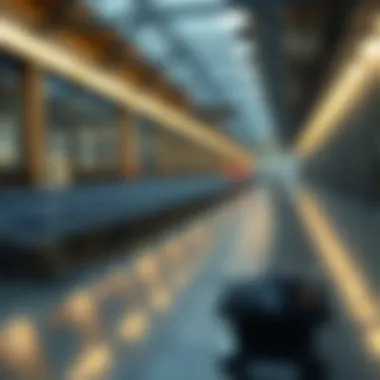

Importance of Renewable Energy in the Region
Renewable energy, particularly solar energy, is vital for Dubai’s long-term sustainability. The reliance on fossil fuels is increasingly seen as an outdated model in light of ongoing climate change concerns. Renewable options like solar not only reduce carbon emissions but also enhance energy security by providing a more stable and sustainable energy source.
In this rapidly evolving global context, Dubai’s embrace of renewable energy can serve as a model for other regions grappling with similar environmental challenges. The conversation around solar energy also ties directly into job creation in the clean energy sector, ranging from installation to maintenance jobs, offering opportunities for local employment.
“Solar energy is not just an alternative; it’s the future. Dubai knows this and is leading the charge.”
By investing in solar options, not only do residents and businesses stand to gain economically but they also contribute to a larger global movement towards renewable energy. This shift is essential not just for complying with local regulations but is also an ethical responsibility in combating climate change. Ultimately, the pursuit of solar energy aligns with both the economic and environmental aspirations of Dubai, marking a significant step forward.
Current State of Solar Panel Prices in Dubai
The current state of solar panel prices in Dubai lays the groundwork for understanding how the market operates and what elements affect costs. For those looking to invest in solar energy, knowing the price landscape is invaluable. This segment not only gives insight into recent price movements but also pinpoints the driving factors shaping these prices. Aligning expectations with current trends equips home buyers, investors, and stakeholders with the foresight necessary to make informed decisions in a rapidly evolving market.
Price Trends Over Recent Years
In the past few years, solar panel prices in Dubai have seen significant fluctuations, reflective of both local demand and global market conditions. Back in 2016, the prices were notably higher due to a limited number of suppliers and competing technologies. However, as more companies entered the market, competition intensified and prices began their steady descent.
According to recent data from the Dubai Electricity and Water Authority (DEWA), installed costs for solar panels dropped by approximately 30% from 2017 to 2021. This trend mirrors what's occurring globally, as economies of scale in manufacturing and advancements in technology create cost efficiencies.
Falling prices have also been attributed to government initiatives aimed at promoting solar energy adoption, making it a more accessible option for everyday consumers. The current average price for installing quality solar panels in Dubai now hovers around AED 1.5 to AED 2.5 per watt, a remarkable turnaround from previous years.
- Key takeaways on price trends:
- Consistent decline in prices since 2016
- Price range of AED 1.5 to AED 2.5 per watt currently.
- Impact of competitive market and technology advancements.
Factors Influencing Pricing
Several factors play crucial roles in determining solar panel prices in Dubai, each intertwined with the broader economic and technological landscape. One of the most compelling elements is raw material costs. The price of silicon, essential for solar panel production, fluctuates significantly and can sway overall pricing for consumers.
Furthermore, import duties and tariffs can have a localized effect on costs, especially for solar equipment imported from abroad. Local regulations, too, can either facilitate or complicate matters. The presence of local manufacturing facilities might help cut costs—but their establishment often relies heavily on government policies.
Other impacts stem from technological advancements within the industry. As innovations improve panel efficiency and durability, the need to replace older panels decreases, ultimately affecting market prices as demand shifts.
Finally, market competition cannot be discounted. With more companies exploring the solar landscape in Dubai and vying for consumer attention, price wars may ensue. This competitive hunt for market share could ultimately lower prices even further as companies seek to differentiate themselves through better pricing strategies.
- Key Influencing Factors:
- Fluctuating raw material costs, particularly silicon.
- Local import tariffs and government regulations.
- Technological advancements increasing efficiency.
- Competition among suppliers affecting market dynamics.
Understanding these factors is essential not just for buyers looking to install solar panels, but also for stakeholders looking to navigate the investment landscape in Dubai's robust and increasingly competitive renewable energy sector. By grasping the nuances of pricing elements, one can better position themselves for potential growth in a city that is rapidly embracing solar energy for a sustainable future.
Cost Breakdown of Solar Panels in Dubai
Understanding the cost elements behind solar panels in Dubai is central to making informed decisions as a potential buyer or investor in the solar market. This section dissects each financial aspect, exploring how costs can vary based on several factors. Whether you’re an expatriate seeking sustainable living solutions or a real estate investor eyeing green technologies, grasping the full cost picture can guide your efforts in maximizing return on investment.
Types of Solar Panels Available
Dubai's solar market offers various types of solar panels, each with unique characteristics and price tags. The three major types are as follows:
- Monocrystalline Panels: Often praised for their high efficiency, these panels are made from a single crystal structure. They typically occupy less space compared to their counterparts but come at a higher price point.
- Polycrystalline Panels: Slightly less efficient than monocrystalline options, polycrystalline panels are made from multiple crystal structures. They are generally more affordable, making them an appealing choice for those on a tighter budget.
- Thin-Film Panels: These panels are lighter and more flexible, offering ease of installation. However, they usually have lower efficiency ratings and shorter lifespans. Price-wise, they are often less expensive upfront but may not be ideal for every situation.
Each type of panel presents its own set of benefits and limitations, aligning with varying consumer needs in the Dubai market. Selecting the right one depends on individual requirements, such as roof space, budget constraints, and energy demands.
Installation Costs and Labor
When delving into the costs associated with solar panels, installation is a significant factor that shouldn’t be overlooked. The installation process encompasses labor, equipment, and system design. Contextually, here is what to expect:
- Labor Costs: Labor makes up a considerable portion of installation costs. Skilled technicians and installers in Dubai typically demand competitive wages due to the professional expertise involved.
- Equipment Fees: Alongside labor, necessary materials and equipment—such as mounting systems, inverters, and wiring—contribute to the overall installation expense.
- System Design: Depending on your home or infrastructure, custom system design may be necessary, further influencing total costs. Complex roof shapes or large-scale setups can elevate labor charges.
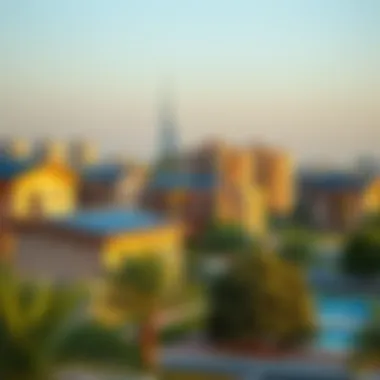

On average, installation costs in Dubai can range between AED 5,000 to AED 15,000, influenced by numerous factors including the scale of the project and the specific components chosen. As always, it’s advisable to get multiple quotes to ensure you’re receiving the best value for your investment.
Maintenance Expenses Over Time
On the maintenance front, solar panels generally require less upkeep than traditional energy systems. However, consider the following ongoing expenses:
- Cleaning Costs: In Dubai, dust accumulation can affect panel efficiency. Regular cleaning—every few months—is recommended, which may entail either DIY efforts or hiring professionals. This can cost anywhere from AED 500 to AED 1,500 annually.
- Inverter Replacement: Solar inverters have limited lifespans, often requiring replacement after 5 to 10 years, triggering additional expenditures.
- Inspection Services: Periodic system checks can help identify issues before they escalate, leading to more significant repair costs. Many homeowners opt for annual inspections, affecting overall service fees.
While solar panels may be robust in terms of durability, it’s essential to factor in these maintenance costs to avoid surprises later on. Doing so aids in providing a clearer perspective on the long-term financial commitment involved in harnessing solar power in Dubai.
In summary, the cost breakdown of solar panels in Dubai encompasses various elements, from types of panels to installation and maintenance expenses. Each of these factors plays a pivotal role in determining the overall affordability and feasibility of investing in solar energy. By understanding these intricacies, potential buyers can make choices that align with both their budget and energy needs.
Government Policies and Incentives
Regulatory Framework Supporting Solar Energy
In Dubai, the regulatory framework guiding solar energy initiatives is robust and multifaceted. The Dubai Electricity and Water Authority (DEWA) plays a pivotal role by implementing various programs and regulations that serve to boost the solar industry. The framework prioritizes the integration of solar solutions into both residential and commercial projects, simplifying the approval processes for new installations.
Some of the key regulations include:
- Net Metering: This system allows users to receive credit for excess energy produced by their solar panels, creating a more attractive economic model for homeowners.
- Green Building Regulations: These urge developers to incorporate sustainable energy sources into new constructions, leading to a shift in how buildings are designed.
- Public-Private Partnerships: Collaborations between government and private entities have led to large-scale solar farms, increasing access and pushing prices down over time.
This regulatory environment not only ensures that solar installations are viable but also encourages ongoing technological advancements in the sector that can further influence price reductions.
Subsidies and Financial Incentives
Financial incentives greatly enhance the appeal of investing in solar energy. The Dubai government offers several subsidies and grants aimed at making solar panel adoption more accessible for residents and businesses alike. Noteworthy incentives include:
- Initial Capital Grants: These one-time subsidies reduce the upfront costs of installing solar panels, making it easier for both new homeowners and established businesses.
- Tax Exemptions: Reduced or eliminated taxes for solar installations can significantly help lower overall costs.
- Soft Loans: For larger commercial projects, the availability of subsidized loan programs ensures that financing solar energy solutions remains attainable.
Furthermore, the long-term savings on electricity bills—combined with potential subsidies—creates a compelling case for solar installations. Over time, as consumers become more aware of these incentives, the demand for solar panels is expected to rise, which could lead to decreased prices through economies of scale.
The combination of government support and favorable regulations has made Dubai a beacon for solar energy development, encouraging both innovation and investment in the sector.
With these policies at play, stakeholders in Dubai’s real estate market—including expatriates, homebuyers, and landlords—stand to gain significantly from adopting renewable technologies and capitalizing on the incentives provided. As the city continues to harness the sun's potential, understanding these policies will be key for future investments.
Comparative Analysis: Dubai vs Global Markets
As the demand for renewable energy continues to grow, understanding how Dubai compares to other regions can provide essential insights for potential buyers and investors in the solar market. This comparative analysis highlights key variations in solar panel pricing and infrastructure, helping to identify what sets Dubai apart while offering a glimpse into the global solar landscape.
How Dubai Stacks Up Against Other Regions
When we take a closer look at how Dubai fits into the global solar market, several aspects come into play. First off, the availability of sunlight plays a pivotal role. Dubai's arid desert climate allows for a staggering amount of sunshine throughout the year. Statistics suggest that Dubai receives about 3,000 hours of sunshine annually — that's a lot of rays to harness. In contrast, regions like Germany, while being leaders in solar adoption, often see limited sun due to their climate.
Additionally, Dubai's government initiatives, such as the Dubai Clean Energy Strategy 2050, have driven increased investment in solar energy infrastructure. These efforts are aimed at achieving 75% of Dubai's energy needs from clean sources by 2050. Comparatively, countries like France and Switzerland have adopted various policies to promote renewable energy, yet they face different challenges such as higher land costs and more stringent regulatory frameworks. This context paints a favorable picture for Dubai as a competitive player in the renewable sector.
To add another layer of depth, when evaluating installation costs, the difference becomes even clearer. In Dubai, installation costs have seen a decrease due to local manufacturing initiatives. By encouraging local companies like JinkoSolar and First Solar to set up operations, the region has managed to cut import fees and associated costs. Meanwhile, countries like the United States are facing rising costs due to tariffs on imported solar panels. This illustrates a significant benefit for prospective buyers in Dubai, who can often secure competitive prices.
Learning from International Pricing Models
Diving deeper into the pricing models from around the globe can provide crucial lessons for Dubai. Countries with established solar industries, such as Spain and Australia, have undergone essential transformations that have led to successful price reductions over time.
For instance, Spain's solar market faced early setbacks due to regulatory changes but recovered impressively by implementing transparent auction systems. These auctions helped to lower the costs attached to solar installations substantially. Implementing similar mechanisms in Dubai could ensure stable pricing and encourage further investment.
Australia, on the other hand, provides a different approach. With a largely decentralized energy system, Australia's emphasis on residential solar installations offers insights into how community-driven models can lead to cost reductions. There's a notable trend of homeowners opting for solar panels, driven by local rebates and incentives, which could serve as a model for Dubai’s own policy framing.
By analyzing international pricing strategies alongside local innovations, stakeholders in Dubai can identify opportunities for cost efficiencies in the solar market. The takeaway is clear: learning from both successes and failures around the globe could lead to better pricing models, ultimately benefitting consumers and investors alike.
Learning from international models is like keeping your ear to the ground; it often reveals trends and insights that can bring better deals home.
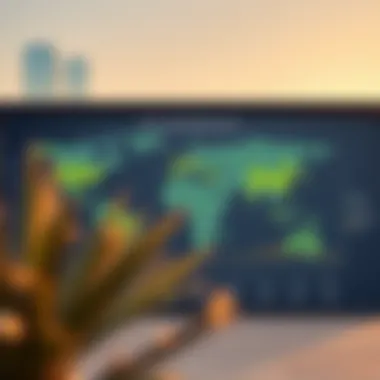

Armed with this information, real estate investors, expatriates, and homebuyers will be better positioned to make informed decisions in the ever-evolving market of solar energy.
Technological Advancements Impacting Prices
In the rapidly evolving landscape of solar energy, technological advancements play a crucial role in shaping solar panel prices. Innovations not only contribute to the efficiency and performance of solar panels but also influence their cost and affordability for consumers. Understanding this connection is essential for anyone considering an investment in solar technology, especially in a market like Dubai, where energy consumption is on the rise.
Innovations in Solar Technology
Recent years have seen significant strides in solar technology, impacting both production costs and panel efficiency. One major advancement is the shift from traditional silicon-based panels to more efficient materials such as perovskite solar cells. Perovskites have shown promise by drastically reducing manufacturing costs while increasing energy conversion efficiency. This is no small feat, as a more efficient panel generates more power from the same amount of sunlight, thus offering more value for money to users.
Another noteworthy innovation is the incorporation of bifacial technology. Bifacial solar panels capture sunlight on both sides, enhancing their overall output. This incremental increase in performance means that even the slightest changes in light conditions can lead to better energy generation throughout the day. As installers and retailers adapt to these trends, it can lead to re-evaluations of current pricing models, driving prices down in response to increased production capability.
Furthermore, developments in solar tracking systems, which allow panels to pivot and follow the sun’s path, have changed the game entirely. By optimizing sunlight exposure, homeowners can achieve a more substantial production rate, which may offset the initial installation investment over time. Clearly, these advancements make solar energy a more attractive option financially.
Role of Energy Storage Solutions
Energy storage technologies also deserve attention, particularly lithium-ion batteries, which have become vital in the realm of solar power. With these batteries, excess energy generated during peak sunlight hours can be stored for use during lower sunlight periods or at night. As this technology improves, the cost of energy storage systems has followed a decreasing trend. This creates a symbiotic relationship between solar panel price dynamics and battery costs.
Consider how the availability of affordable energy storage can potentially change the pricing landscape: with households able to utilize self-generated solar energy around the clock, reliance on grid power diminishes. This reduced dependence creates substantial savings in energy costs and shifts the buyer's perspective—investments in solar panels and storage begin to appear as long-term financial strategies instead of tough-to-sell gadgets.
These developments lead to direct implications for investors and homeowners in Dubai. Not only do they present opportunities for reduced energy costs, but they also transform solar energy into a more reliable resource. As Dubai strives to position itself as a leader in renewable energy, staying informed about these technological advancements helps prospective buyers make more educated decisions.
"The evolution of solar technology is like watching a young artist refining their craft; with each stroke, they bring us closer to a masterpiece that everyone can benefit from."
As we look to the future, it's clear that understanding the technological landscape surrounding solar panel prices is essential for making informed investments. Alongside innovations in solar panels and advancements in energy storage, consumers should remain aware of the broader implications these changes have on pricing and availability within the Dubai solar market.
Future Outlook for Solar Energy in Dubai
Understanding the future of solar energy in Dubai is crucial for a variety of stakeholders—homebuyers exploring property investments, expatriates considering the transition to renewable energy, and investors looking for growth opportunities. Dubai's strategic emphasis on sustainable energy aligns with its larger vision to promote innovation and reduce its carbon footprint. As solar technology advances, coupled with government support and evolving market dynamics, predicting future solar panel prices becomes essential for making informed decisions.
Projected Price Trends
Looking ahead, there's a strong likelihood that solar panel prices in Dubai will continue on a downward slope, driven by advancements in technology and increased competition among suppliers. A few key elements shaping these price trends include:
- Technological Improvements: Enhanced manufacturing processes can lead to lower production costs for solar panels. This means more efficient panels for buyers at potentially reduced prices.
- Increased Local Production: With initiatives aimed at boosting local manufacturing capacity, investments in factories focused on solar technology can significantly cut costs and delivery times for buyers in Dubai.
- Public Awareness: As more people embrace solar energy, demand is poised to rise. With this heightened engagement, it’s reasonable to expect more competitive pricing as businesses vie for market share.
Also, the push for net-zero carbon emissions by 2050 could create a more favorable market for solar solutions. As policies evolve to support renewables, consumers might see both state-backed initiatives and more private-sector incentives, which could directly impact pricing.
Potential Market Changes and Growth Areas
The solar energy market in Dubai isn’t just about price; it’s also about where the market is heading and what exciting developments are on the horizon. Several noteworthy changes are likely to shape the landscape in the coming years:
- Integration with Smart Technologies: The rise of smart home devices will drive demand for solar panels integrated with energy management systems, thus creating new opportunities for innovative products.
- Energy Storage Solutions: As energy storage becomes more affordable and efficient, the appeal of solar-powered systems that ensure round-the-clock energy availability will be greatly enhanced. Homeowners may find it increasingly feasible to adopt complete solar solutions that store energy produced during the day for use at night.
- Expansion into Commercial Sectors: While residential adoption has taken off, the commercial sector offers a vast, untapped market. Businesses are likely to explore solar options for operational cost reduction, thus further expanding the demand and potential for solar products.
Moreover, partnerships between government and private entities to roll out large-scale solar projects can foster innovation and attract foreign investments, ultimately positioning Dubai as a renewable energy hub in the region.
"As the world leans into sustainability, the sun isn't just shining on our rooftops; it's illuminating a path toward a greener future."
Epilogue
As we reach the end of our exploration of solar panel pricing in Dubai, it becomes clear that understanding this landscape is paramount for various stakeholders. From real estate investors to homebuyers, the implications of solar energy adoption can significantly affect decisions ranging from property investments to personal energy choices. Evaluating solar panel prices involves more than just considering initial costs; it intertwines governmental incentives, technological advancements, and long-term economic savings.
Key Takeaways on Solar Panel Pricing
- Diverse Pricing Factors: Prices for solar panels in Dubai are not set in stone. They fluctuate due to numerous factors such as installation labor, maintenance requirements, and available subsidies.
- Government Influence: Local policies play a crucial role. Incentives offered by the Dubai governmental bodies can ease the initial financial burden on buyers, making solar energy more accessible.
- Long-Term Savings: Investing in solar is not just about upfront costs but rather about potential savings in energy bills over time, which can add up significantly in a region with abundant sunlight.
- Technology Trends: Staying abreast of technological innovations in solar efficiency can help future-proof investments. The evolution in solar technology can change pricing dynamics in unforeseen ways.
- Market Comparisons: Understanding the pricing models used in other regions can provide valuable insights. By comparing Dubai's solar market with global trends, investors can make informed decisions based on broader contexts.
"Making the switch to solar isn’t merely a trend; it's a viable financial strategy that aligns with a sustainable future."
Encouraging Sustainable Practices
In this rapidly developing urban landscape, fostering sustainable practices is not just beneficial, but crucial. This commitment goes beyond individual actions; it involves altering the fabric of community living. Encouraging the adoption of solar energy can lead to a multitude of benefits:
- Environmental Impact: Reducing the carbon footprint of homes and businesses contributes to cleaner air and a healthier community.
- Energy Independence: By investing in solar power, Dubai can reduce its dependence on fossil fuels, promoting energy security and resilience.
- Community Awareness: Expanding knowledge about solar energy benefits fosters a culture of sustainability that can lead to broader acceptance and implementation among residents.
- Investment Opportunities: As more people shift towards sustainable practices, new markets and investment opportunities come to life, further driving economic growth.
In sum, the dialogue surrounding solar panel prices in Dubai isn't just a financial discussion; it’s a call towards embracing sustainable development and building a future that respects both economic and environmental considerations. By evaluating these aspects thoughtfully, stakeholders can play a part in evolving Dubai's energy landscape for the better.







